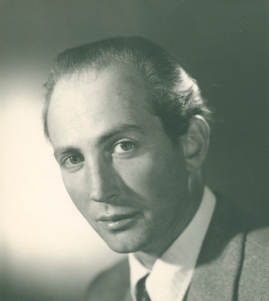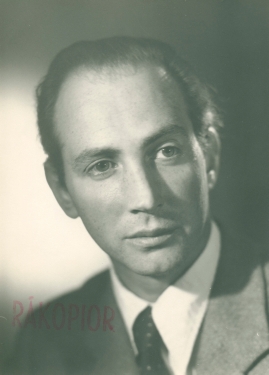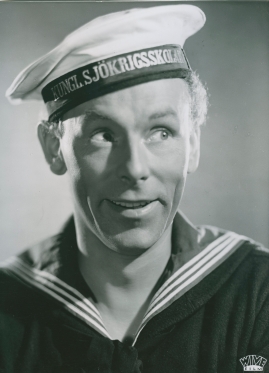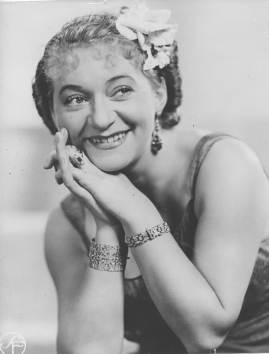Göran Gentele
Table of contents
- Basic facts
- Links and resources
- Biography
- Awards
- Films
- Original work
- Soundtrack listing
- Groups
Basic facts
Media (2)
| Director |
|
|---|---|
| Screenplay |
|
| Show all films | |
| Awards |
|
Biography
Swedish film, theatre and opera director and actor. Born in Stockholm.-His parents were well-to-do and his mother had planned a career in the diplomatic corps for Göran Gentele. But she was also keen on music, often taking her children to the theatre or the opera, and this proved more attractive for him. Having studied Civics and French for a time, in 1941 he applied to the Royal Dramatic Theatre Drama School and was accepted.He was more inclined, however, towards directing than acting, and after a number of plays for young people his breakthrough...
Biography
Swedish film, theatre and opera director and actor. Born in Stockholm.
-
His parents were well-to-do and his mother had planned a career in the diplomatic corps for Göran Gentele. But she was also keen on music, often taking her children to the theatre or the opera, and this proved more attractive for him. Having studied Civics and French for a time, in 1941 he applied to the Royal Dramatic Theatre Drama School and was accepted.
He was more inclined, however, towards directing than acting, and after a number of plays for young people his breakthrough as a director came with Staffan Tjerneld's detective comedy "Brott i sol" ('Crime in the Sun', 1946). This was followed by successful productions of plays by Calderon, Dagerman, Sartre, Shaw and others, but the cinema also attracted him. In 1944-1945 he was assistant director to his Dramatic Theatre colleague Rune Carlsten in the making of Den allvarsamma leken ('The Serious Game') and Svarta rosor ('Black Roses'), prompting Lorens Marmstedt to allow him to make his directorial debut with a film version of Brott i sol (1947).
Gentele's real breakthrough as a film director came with the comedy Leva på "Hoppet" ('Living on the "Hope"'), about six hopeful young drama students who hire a boat and give theatre performances along Sweden's Göta Canal. "Without exaggeration, the purest breath of fresh air in Swedish cinema for many years", as one critic put it, and in 1951 the film picked up a Silver Bear for best comedy at the Berlin Film Festival.
In the same year Gentele was appointed principal director of the Royal Swedish Opera, where he quickly renewed the repertoire with newly written works by composers such as Alban Berg, Menotti and not least Karl-Birger Blomdahl, who set Harry Martinsson's "Aniara" to music. It took six years before he found time to return to film with a new version of F.A. Dahlgren's classic musical comedy Värmlänningarna ('The Värmlanders', 1957).
Though not perhaps a classic film, this virtually definitive version of a national romantic song and music spectacular is here presented in its most Swedish form, an echo of the "folklustspel" (a rather lowbrow and rustic comedy tradition which is a hugely popular part of Swedish theatre and cinema heritage). The direction is appealing, festive and colourful, resonant with folklore and folkdance.
His most successful venture came the following year with Fröken April ('Miss April', 1958) another comedy with links to the theatre, partly filmed at the Swedish Royal Opera House. It has maintained its charm over the years with Lena Söderblom in the role of her life, backed up by Gunnar Björnstrand and Jarl Kulle, whose singing competition in two open top cars is one of the classic scenes of Swedish comedy.
The follow up, Sängkammartjuven ('The Bedroom Thief', 1959) was also a major box office success, but two subsequent films made less of an impression. His final film was Miss and Mrs. Sweden (1969), an incisive comedy about the world of weekly magazines written by Lars Forssell. It suited Gentele's humour, playfulness and irony but fails to come up to the mark in its entirety. It does have its moments of sparkle, however, including the mirrored door set-up of the editor's office, and Jarl Kulle, Sven Lindberg and Gunn Wållgren all give irresistible performances.
In 1971 Gentele was appointed director of the Metropolitan Opera in New York, but the very next year he and two of his daughters died in a car accident. Isaac Stern has remarked of Gentele's opera productions that "everything he did was a pure delight". The same applies to his film comedies. They were made with joy and it was joy that he gave to others: praise indeed.
Bengt Forslund (2011)
(translated by Derek Jones)
Awards
| Swedish Film Society Prize | Stockholm | 1960 | (hedersdiplom) |
|---|
Films
| Director |
|
|---|---|
| Screenplay |
|
| Cast | |
| Assistant Director |
|
| Production Assistant |
|




